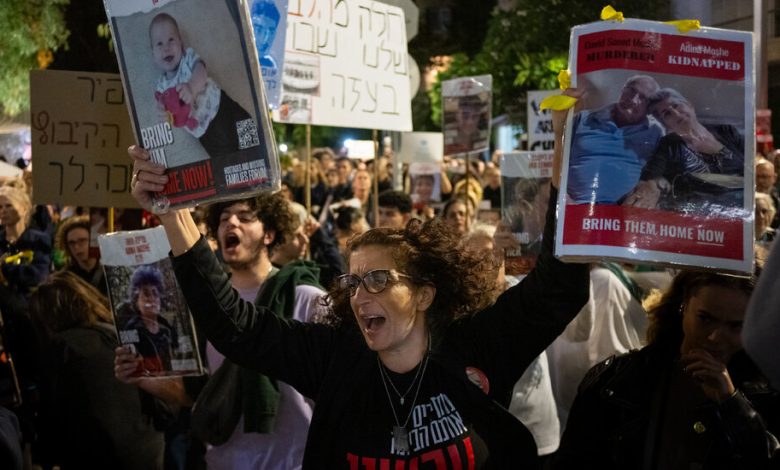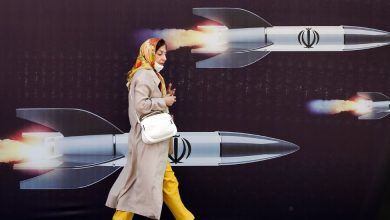Israel, Hamas Agree to Begin Cease-Fire Friday Morning

After tortuous, weekslong negotiations, Israel and Hamas reached an agreement Thursday for a brief cease-fire that will begin on Friday morning and allow for the release of at least 50 women and children held hostage in Gaza. In return, Israel agreed to a pause in hostilities of at least four days and the release of 150 Palestinian women and minors imprisoned in Israeli jails.
The cease-fire, announced by the Qatar Foreign Ministry, marks the most significant diplomatic breakthrough since Hamas’s Oct. 7 attacks on Israel, which killed 1,200 people, according to the Israeli authorities, and prompted a devastating Israeli invasion of Gaza. It is scheduled to take effect at 7 a.m. local time.
The first 13 hostages will be released to Mossad, Israel’s foreign intelligence agency, apparently in good health, at 4 p.m., according to Qatar, which helped broker the deal. Lists of freed hostages and prisoners will be released day-to-day, with the goal of a further agreement to extend the pause in hostilities and release more hostages.
“The first glimmer of light at the end of the tunnel,” said Majed al-Ansari, a spokesman for Qatar’s Foreign Ministry, in announcing the deal.
The Biden administration played a significant role in pushing for the deal, along with the governments of Qatar and Egypt. The cease-fire was originally expected as early as Thursday morning but negotiators required more time to hammer out details — sticking points included the number of hostages Hamas actually held — underscoring the agreement’s fragility.
But even as the deal came together, the Israeli bombardment continued in Gaza, where at least 12,700 people have been killed, according to health officials in the enclave. Lt. Col. Richard Hecht, an Israeli military spokesman, told reporters, “Until we’re given the order to hold our fire, our operations are continuing.” In some southern Israeli communities, air-raid sirens warning of incoming rocket fire from Gaza still wailed.
Israeli forces said on Thursday that they had detained the director of Al-Shifa Hospital, Dr. Mohammad Abu Salmiya, for questioning “following evidence showing that the Al-Shifa Hospital, under his direct management, served as a Hamas command and control center.”
And on both sides of the border, families of the captives waited with terrible trepidation, counting down the hours, hoping their loved ones might be among those released and that nothing at the last minute would go wrong.
The family of Avigail Idan, a small child whose parents were murdered in front of their children by Hamas militants at a kibbutz during the Oct. 7 assault, hoped that they would be able to celebrate her fourth birthday with her on Friday.
“I find myself barely breathing through the last 24 hours,” her aunt, Tal Idan, said after the announcement of the agreement. “Every hour that goes by feels like forever.”
White House officials, who spoke on the condition of anonymity to discuss the five weeks of sensitive negotiations that had led to the agreement, said on Tuesday that they expected the final list of 50 hostages to to include the release of three Americans: two women and the child, Avigail, whose name has also been spelled “Abigail” in the U.S. media and who is a dual Israeli and U.S. citizen. But it wasn’t clear if they would be released in the first group on Friday.
In the Israeli-occupied West Bank, where the Israeli military has been carrying out nightly raids, the siblings of Walaa Tanji, 26, began frantically preparing for her arrival when they heard she might be released from an Israeli jail. Having already had their hopes dampened the previous day, they nevertheless arranged to bring family members and rented plastic chairs to accommodate the crowds.
Israel detained Ms. Tanji over a year ago at her home in the Balata refugee camp on the outskirts of Nablus, along with two other women. Israel’s military accused the three of planning an attack on an Israeli checkpoint and said it had found firearms in a car they were using. Nagham Tanji, Walaa’s older sister, said that her sister was innocent and that she had yet to be charged or sentenced.
And in the Gaza Strip, Palestinians who have endured nearly seven weeks of intense airstrikes waited anxiously for the truce.
“I will live in safety, even if it’s temporary and short, without hearing explosions near or far,” Shadi Hijazi, a 23-year-old construction worker, said in a phone interview.
Qatar announced it would send a plane loaded with 41 tons of aid to the Gaza Strip, where an estimated 2.2 million Palestinians desperately need humanitarian aid and are running short of water, food and medicine. Several international humanitarian organizations said the four-day cease-fire window was too tight to address the dire situation.
The executive director of UNICEF, Catherine Russell, told the U.N. Security Council on Wednesday that the organization was “positioned to quickly scale up the delivery of desperately needed humanitarian aid in Gaza.” But, she said, “this is far from enough” to meet the growing needs of Palestinians.
In Israel, the conditions of the agreement, and whether to cut a deal at all, were fiercely debated within the government, as some top officials worried that agreeing to a cease-fire prematurely would allow Hamas to regroup, reduce global attention on the remaining 190 hostages and end up posing an even greater risk to Israeli security.
Another group of Israeli leaders argued that something was better than nothing, and that the invasion could continue after the cease-fire. The skeptics managed to delay the deal for weeks in the hopes of increasing their military advantage and negotiating leverage.
Last week they successfully bid for more time to allow the Israeli army to capture Al-Shifa Hospital, Gaza’s largest. Israel has since bolstered its claim that the hospital conceals a military headquarters by presenting a video of what it says is a tunnel leading under the hospital, as well as security camera footage of hostages being taken into the hospital. Hamas denies the accusations.
In recent days, opposition to the cease-fire deal in Israel subsided as pressure from United States and at home built to secure the release of hostages.
“We hope to get our hostages out; there are many challenges along the way,” Mr. Netanyahu said Thursday, defending the decision to accept a deal that released some, but not all, of the roughly 240 people believed to be held in Gaza. “We hope to get the first group out, and after that, we are committed to getting everyone out.”
The ratio of about one Israeli hostage in Gaza released for every three freed Palestinian prisoners has angered some Israeli families of those abducted. Hamas officials have said one of the objectives of the Oct. 7 attack was to win the release of some of the thousands of Palestinians jailed in Israel, many of them accused of violence against Israeli soldiers and civilians. Many Palestinians say such violence is legitimate resistance to Israel’s decades-long occupation of the West Bank and repeated military campaigns in Gaza.
Successive Israeli governments have determined that swapping many prisoners for even a few captured civilians and soldiers is a price worth paying, most notably perhaps in 2011 when Israel released more than 1,000 Palestinian prisoners in exchange for a lone Israeli soldier, Gilad Shalit, who had been captured by Hamas in Gaza in 2006. One of the Palestinians freed in the deal, Yahya Sinwar, eventually became Hamas’s leader in Gaza and, according to Israeli officials, a mastermind of the Oct. 7 attacks.
Reporting was contributed by Katherine Rosman, Roni Rabin and Nadav Gavrielov.



